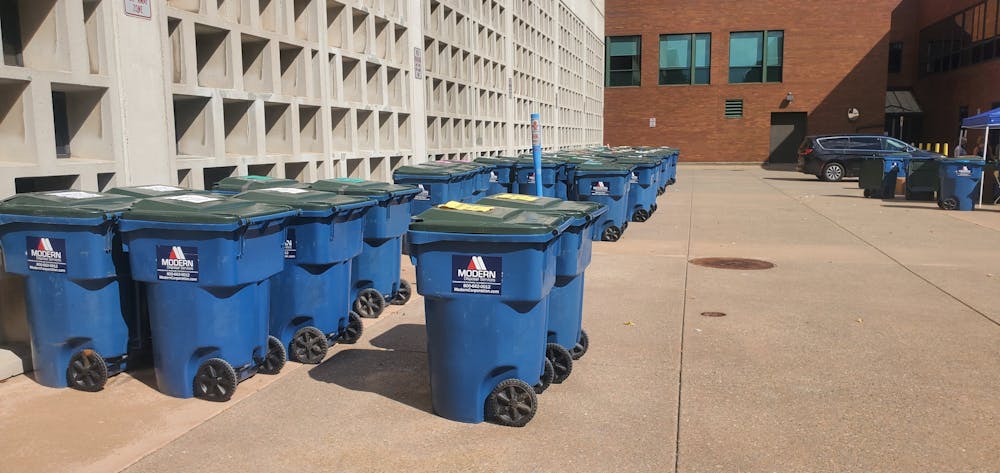UB removes just over a ton of waste from its campuses every day, a majority of which ends up in landfills. The university is working toward sending only 10% of UB-generated waste to landfills, but around 70-80% of waste currently goes to the dump.
What’s thrown in a UB recycling bin goes through a complicated process that ends on the global market, a compost pile, or — if done incorrectly — back in a landfill anyway.
Custodians collecting recycling bags assess the contents of those bags for “contamination,” or the amount of food waste and non-recyclable items present. “Contamination” must make up less than 10% of a bag’s contents to be accepted by Modern Disposal, the waste management and recycling company that retrieves bags from recycling dumpsters, totes, or compactors across UB’s non-leased properties. If a bag has a contamination rate above 10%, it ends up in the trash.
Modern Disposal takes the recycling bags to a facility in South Buffalo, where the contents are sorted. The sorting process begins with humans, who pick trash items away from a stream of materials on a conveyor belt, and ends with a series of machines that root out non-recyclable items.
Once sorted, like items — aluminum cans, cardboard, etc. — are compacted into large bales and sold to a recycling mill. From there, the bales are broken down, sold to factories on the open market and made into new products.
As part of its efforts to find solutions to contamination and encourage proper recycling, UB conducted a large-scale waste audit in late September. This involved collecting 2,140 pounds worth of trash and recycling bags from a dozen buildings across all three campuses. Volunteers and sustainability office staff then sorted and analyzed the waste to determine how much trash ends up in the recycling, how much recycling ends up in the trash, and what kind of items end up in each.
Sustainability Education Manager Erin E. Moscati, who works in the Office of Sustainability, hopes to use this data to improve education across campus and encourage proper disposal of items.
“If we see that there are a lot of disposable coffee lids in the recycling, can we begin a practice where lids are only available upon request?” Moscati said. “It’ll be practical suggestions like that too.”
Moscati also sees room for improvement in UB’s third kind of waste receptacle: the compost.
“Every time I go into One World, there’s definitely people that — I don’t know if they’re confused or if they’re just not paying attention — but there will be compost containers in the trash or recycling,” Moscati said.
Compost bags are brought to a trash room in Capen and refrigerated to prevent bad odors. Non-compostable items are removed there so that the rest can be passed on to a recycling company.
“The compost company that we use, Natural Upcycling, is pretty strict,” Moscati said. “They will reject loads right on the dock if there’s contamination. It’s a lot of plastics that people assume are a bioplastic, and it’s not.”
Natural Upcycling takes the material from UB to an anaerobic digester to help create feed stock, renewable energy sources and fertilizer.
Moscati says it’s important to be conscious of the totality of the recycling process. Some plastic materials may appear recyclable, but aren’t. This is especially true following a recent plastic scrap import ban by China, which bans the purchase of lower grade plastics.
“What companies like Modern [Disposal] are able to sell is now much more limited. However, I think it’s more realistic,” said Moscati. “It’s really opened people’s eyes to plastic waste as an issue because we used to just ship it to Third World countries, and then it was their problem.”
Moscati also said it’s important to strive toward a “closed-loop” system, where all materials are post-consumer recycled content, or items that are made of fully recycled material and then recycled once again.
The future of recycling logistics at UB is not set in stone, but Moscati has some ideas to reach 90% diversion by 2030. She wants to acquire more fiber-based items as opposed to compostable plastics because they can be broken down faster.
The Office of Sustainability also wants to work with Campus Living to create consistency between residence halls, as differences in how and where to recycle can be highly variable across different dorms.
“Not only are we wanting people to engage in this behavior, we’re empowering them to engage in the behavior,” Moscati said. “We need to really expand our infrastructure on this campus... But UB is a small city, so it will take time.”
Dominick Matarese is the senior features editor and can be reached at dominick.matarese@ubspectrum.com

Dominick Matarese is the Senior Features Editor at the Spectrum. He enjoys writing about interesting people, places, and things. In addition to running an independent blog, he has worked worked with the Owego Pennysaver, BROOME Magazine, the Fulcrum Newspaper, and Festisia. He is passionate about music journalism and can be found enjoying live music most weekends.





